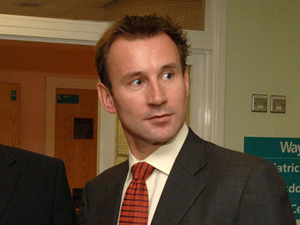



Date:15/09/11
 UK Culture Secretary Jeremy Hunt has delivered a hard-hitting speech, calling on net firms, advertisers and credit card companies to cut ties with websites that link to unlawful content.
UK Culture Secretary Jeremy Hunt has delivered a hard-hitting speech, calling on net firms, advertisers and credit card companies to cut ties with websites that link to unlawful content.
In a speech to the Royal Television Society, he said he wanted to make it harder for such sites to prosper.
Ideally the government would like to see Google remove pirate sites from its search engine completely.But Google's response suggested this was unlikely.
"Without a court order, any copyright owner can already use our removals process to inform us of copyright infringing content and have it removed from Google Search," the firm said in a statement.
It may not be enough for Mr Hunt, who appeared to be on an anti-piracy crusade. In his speech, he denied that blocking access to pirated content was an attack on net neutrality."Unlawfully distributing copyrighted material is theft - and a direct assault on the freedoms and rights of creators of content to be rewarded fairly for their efforts," he said.
"We do not allow certain products to be sold in the shops on the High Street, nor do we allow shops to be set up purely to sell counterfeited products. Likewise we should be entitled to make it more difficult to access sites that are dedicated to the infringement of copyright," he added.
Many of the changes mooted by Mr Hunt are destined for the new Communications Act which is due to become law towards the end of the current Parliament in 2015.
Jeremy Hunt urges web firms to join anti-piracy drive
 UK Culture Secretary Jeremy Hunt has delivered a hard-hitting speech, calling on net firms, advertisers and credit card companies to cut ties with websites that link to unlawful content.
UK Culture Secretary Jeremy Hunt has delivered a hard-hitting speech, calling on net firms, advertisers and credit card companies to cut ties with websites that link to unlawful content. In a speech to the Royal Television Society, he said he wanted to make it harder for such sites to prosper.
Ideally the government would like to see Google remove pirate sites from its search engine completely.But Google's response suggested this was unlikely.
"Without a court order, any copyright owner can already use our removals process to inform us of copyright infringing content and have it removed from Google Search," the firm said in a statement.
It may not be enough for Mr Hunt, who appeared to be on an anti-piracy crusade. In his speech, he denied that blocking access to pirated content was an attack on net neutrality."Unlawfully distributing copyrighted material is theft - and a direct assault on the freedoms and rights of creators of content to be rewarded fairly for their efforts," he said.
"We do not allow certain products to be sold in the shops on the High Street, nor do we allow shops to be set up purely to sell counterfeited products. Likewise we should be entitled to make it more difficult to access sites that are dedicated to the infringement of copyright," he added.
Many of the changes mooted by Mr Hunt are destined for the new Communications Act which is due to become law towards the end of the current Parliament in 2015.
Views: 981
©ictnews.az. All rights reserved.Similar news
- 24% of U.S. Adults have made phone calls on the Internet
- UNESCO puts sustainable learning online
- Australia gives incentives for the use of telehealth
- US launches computer programme for poor kids
- UN declares web access as human right
- Facebook growth slows in stalkerbase heartlands
- One Third of Millionaires Use Social Media
- Facebook Seeks Bigger Role in Software for Mobile Apps
- Icann increases web domain suffixes
- IBM launches new social networking platform for enterprises
- Google Notches One Billion Unique Visitors Per Month
- Internet providers cut international channel renting costs by 60%
- Azerbaijan launches standard time on internet
- Icann launches facility to ease DNSSec adoption
- Social network data mining yields worrying results for traditional media





















